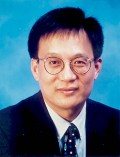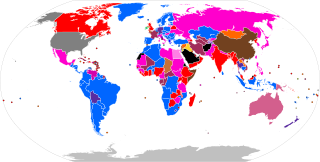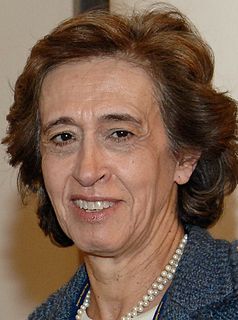
The Election for the 6th Legislative Yuan (第六屆立法委員選舉) of Taiwan was held on December 11, 2004. All 225 seats of the Legislative Yuan were up for election: 168 elected by popular vote, 41 elected on the basis of the proportion of nationwide votes received by participating political parties, eight elected from overseas Chinese constituencies on the basis of the proportion of nationwide votes received by participating political parties, eight elected by popular vote among the aboriginal populations. Members served three-year terms beginning on February 1, 2005, and ending January 31, 2008. The next term served four years.

The 2004 Hong Kong Legislative Council election was held on 12 September 2004 for members of the Legislative Council of Hong Kong (LegCo). The election returned 30 members from directly elected geographical constituencies and 30 members from functional constituencies, of which 11 were unopposed.
Regular elections in Croatia are mandated by the Constitution and legislation enacted by Parliament. The presidency, Parliament, county prefects and assemblies, city and town mayors, and city and municipal councils are all elective offices. Since 1990, five presidential elections have been held. During the same period, nine parliamentary elections were also held. In addition, there were six nationwide local elections. Croatia has held two elections to elect 11 members of the European Parliament following its accession to the EU on 1 July 2013.
Elections in the Republic of India constitution include elections for the Parliament, Rajya Sabha, Lok Sabha, the Legislative Assemblies, and numerous other Councils and local bodies.

The Federal Senate is the upper house of the National Congress of Brazil. Created by the first Constitution of the Brazilian Empire in 1824, it was initially similar to the United Kingdom's House of Lords. Since the Proclamation of the Republic in 1889 the Federal Senate has resembled the United States Senate.

The 1872 South Carolina gubernatorial election was held on October 16, 1872 to select the governor of the state of South Carolina. Franklin J. Moses, Jr. won the election as a Radical Republican against the more moderate faction of the Republican Party and became the 75th governor of South Carolina.

The 2007 Turkish presidential election refers to two attempts to elect the country's 11th president, to succeed Ahmet Necdet Sezer. The most likely candidate for president was Abdullah Gül. Turkey's presidential office is regarded as the guardian of the country's secular system; the fact that Gül's wife wears the Islamic headscarf, as well as his own history in political Islam, turned the elections into a political crisis.

People Before Profit (PBP) is a socialist political party formed in October 2005. It is active in both the Republic of Ireland and Northern Ireland.
The following lists events that happened during 1952 in Afghanistan.
Elections to the Baseball Hall of Fame for 1974 followed the system in place since 1971.
The Baseball Writers' Association of America (BBWAA) voted by mail to select from recent major league players and
elected two, Whitey Ford and Mickey Mantle.
The Veterans Committee met in closed sessions to consider executives, managers, umpires, and earlier major league players.
It selected three people: Jim Bottomley, Jocko Conlan, and Sam Thompson.
The Negro Leagues Committee also met in person and selected Cool Papa Bell.
Elections to the Baseball Hall of Fame for 1972 followed the system established one year earlier.
The Baseball Writers' Association of America (BBWAA) voted by mail to select from recent major league players and
elected three: Yogi Berra, Sandy Koufax, and Early Wynn.
The Veterans Committee met in closed sessions to consider executives, managers, umpires, and earlier major league players.
It also selected three people: Lefty Gomez, Will Harridge, and Ross Youngs.
The Negro Leagues Committee met for the second time and selected Josh Gibson and Buck Leonard.

The election of president and vice president of the United States is an indirect election in which citizens of the United States who are registered to vote in one of the 50 U.S. states or in Washington, D.C. cast ballots not directly for those offices, but instead for members of the U.S. Electoral College, known as electors. These electors then in turn cast direct votes, known as electoral votes, for president, and for vice president. The candidate who receives an absolute majority of electoral votes is then elected to that office. If no candidate receives an absolute majority of the votes for President, the House of Representatives chooses the winner; if no one receives an absolute majority of the votes for Vice President, then the Senate chooses the winner.

The 2010 congressional elections in Rhode Island were held on November 2, 2010, and determined who would represent Rhode Island in the United States House of Representatives. Representatives are elected for two-year terms; the elected served in the 112th Congress from January 3, 2011 until January 3, 2013.

An electoral system is a set of rules that determine how elections and referendums are conducted and how their results are determined. Political electoral systems are organized by governments, while non-political elections may take place in business, non-profit organisations and informal organisations.
Presidential and vice presidential elections, legislative elections and local elections were held in the Philippines on May 11, 1992. An estimated 80,000 candidates ran for 17,000 posts from the Presidency down to municipal councillors in the first general election under the 1987 Constitution. Even though she was permitted by the Constitution to run for a second term, President Corazon Aquino did not stand for re-election.

The Portuguese local elections of 2009 took place on 11 October. The elections consisted of three separate elections in the 308 Portuguese municipalities, the election for the Municipal Chambers, whose winner is elected mayor, another election for the Municipal Assembly and a last one for the lower-level Parish Assembly, whose winner is elected parish president. This last was held separately in the more than 4,000 parishes around the country.

Legislative elections were held in East Bengal between 8 and 12 March 1954, the first since Pakistan became an independent country in 1947. The opposition United Front led by the Awami League and Krishak Sramik Party won a landslide victory with 223 of the 309 seats. The Muslim League Chief Minister of East Pakistan Nurul Amin was defeated in his own constituency by Khaleque Nawaz Khan by over 7,000 votes, with all the Muslim League ministers losing their seats.

Presidential elections were held in Mongolia on 26 June 2017. Incumbent President Tsakhiagiin Elbegdorj, first elected in 2009 and re-elected in 2013, was constitutionally barred from running for a third term. For the first time, no candidate received a majority of the vote in the first round, forcing a run-off between Khaltmaagiin Battulga and Miyeegombyn Enkhbold on 7 July, brought forward from 9 July. The third-placed candidate Sainkhuugiin Ganbaatar refused to recognise the results after he missed out on the second round due to finishing 1,849 behind Enkhbold, claiming that an additional 35,000 votes had been added to the total and there had been fraud. His Mongolian People's Revolutionary Party demanded a recount of votes in Bayan-Ölgii.
The 1931 Spanish local elections were held on 12 April throughout all Spain municipalities to elect 80,472 councillors.
These elections were perceived as a plebiscite on the monarchy of Alfonso XIII. The Second Spanish Republic was proclaimed after this election.
The 1909 Chinese Provincial Assembly elections were held to elect the members of the Provincial Assemblies of China in April and June 1909 as part of the New Policies under the Qing government as a move toward constitutional monarchy. The Provincial Assemblies were convened on 14 October 1909 and were responsible for electing half of the members of the National Assembly convened subsequently in 1910. The assemblies survived until the fall of the Qing dynasty in 1912 after the Hsinhai Revolution.













